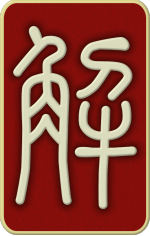
解 Xiè Release (Relief) [hexagram 40]


Thunder over Water
 Wood element
Wood element
Lunar month: 2 ; Host (controlling) line : 2
The Decision
Advantage in the south-west. If nothing to do, returning is fortunate; if there is something to do, rapid completion is advisable.
In ‘Release’ there is danger, forcing movement to escape it. ‘Advantage in the south-west’ – win over the crowd. ‘If nothing to do, returning is fortunate’ – finding the center. ‘If there is something to do, rapid completion is advisable’ – advancement is creditable. Heaven and Earth are released after winter to give thunder and rain and then the buds will burst. Magnificent is the opportune timing of release.
解: 利西南, 无所往, 其来复吉. 有攸往, 夙吉. Jiě: lì xī nán, wú suǒ wǎng, qí lái fù jí. yǒu yōu wǎng, sù jí.
彖传: 解, 险以动, 动而免乎险, 解. 解利西南, 往得众也. 其来复吉, 乃得中也. 有攸往夙吉, 往有功也. 天地解, 而雷雨作, 雷雨作, 而百果草木皆甲坼, 解之时大矣哉! Tuàn zhuàn: Jiě, xiǎn yǐ dòng, dòng ér miǎn hū xiǎn, jiě. jiě lì xī nán, wǎng dé zhòng yě. qí lái fù jí, nǎi dé zhòng yě. yǒu yōu wǎng sù jí, wǎng yǒu gōng yě. tiān dìjiě, ér léi yǔ zuò, léi yǔ zuò, ér bǎi guǒ cǎo mù jiē jiǎ chè, jiě zhī shí dà yǐ zāi!
The Image
Thunder and rain together form ‘Release’. The wise accordingly forgive mistakes and deal leniently with misdemeanors.
象传: 雷雨作, 解; 君子以赦过宥罪 Xiàng zhuàn: Léi yǔ zuò, jiě; jūn zǐ yǐ shè guò yòu zuì
Line Change 1
Not to blame.
The strong and weak are in harmony so it is right ‘Not to blame’.
初六: 无咎. Chū liù: wú jiù.
象传: 刚柔之际, 义无咎也. Xiàng zhuàn: Gāng róu zhī jì, yì wú jiù yě.
Line Change 2
Catching three foxes and claiming the golden arrow, with steadfastness all will be well.
The good fortune from the second ‘nine’ stems from the middle course.
九二: 田获三狐, 得黄矢, 贞吉. Jiǔ èr: tián huò sān hú, dé huáng shǐ, zhēn jí.
象传: 九二: 田获三狐, 得黄矢, 贞吉. Xiàng zhuàn: Jiǔ èr: tián huò sān hú, dé huáng shǐ, zhēn jí.
Line Change 3
Carrying heavy luggage in a car that tempts thieves. However strong-willed there will be cause for regret.
‘Carrying heavy luggage in a car’ – invites attention. ‘Tempts thieves’ – who else is there to blame?
六三: 负且乘, 致寇至, 贞吝. Liù sān: fù qiě chéng, zhì kòu zhì, zhēn lìn.
象传: 负且乘, 亦可丑也, 自我致戎, 又谁咎也. Xiàng zhuàn: Fù qiě chéng, yì kě chǒu yě, zì wǒ zhì róng, yòu shéi jiù yě.
Line Change 4
Take off your house shoes; friends will come and it will be an amicable occasion.
‘Take off your house shoes’ – as the place is inappropriate for them.
九四: 解而拇, 朋至斯孚. Jiǔ sì: jiě ér mǔ, péng zhì sī fú.
象传: 解而拇, 未当位也. Xiàng zhuàn: Jiě ér mǔ, wèi dāng wèi yě.
Line Change 5
The wise relieve hardship to bring good fortune, garnering trust from the common people.
‘The wise relieve hardship’ – while the common people were in despair.
六五: 君子维有解, 吉; 有孚于小人. Liù wǔ: jūn zǐ wéi yǒu jiě, jí; yǒu fú yú xiǎo rén.
象传: 君子有解, 小人退也. Xiàng zhuàn: Jūn zǐ yǒu jiě, xiǎo rén tuì yě.
Line Change 6
The young leader shoots a falcon on a high wall and hits it. Everything is advantageous.
‘The young leader shoots a falcon’ – removing the disaffected.
上六: 公用射隼于高墉之上, 获之, 无不利. Shàng liù: gōng yòng shè sǔn yú gāo yōng zhī shàng, huò zhī, wú bù lì.
象传: 公用射隼, 以解悖也. Xiàng zhuàn: Gōng yòng shè sǔn, yǐ jiě bèi yě.
The full set of 64 English translations is available in our new book 'Book of Changes - Deciphered' ➚.